This week’s interview is with Camille Hunt, a New York-based figurative artist known for her work with bodyprinting; a form of art where Camille teaches her subjects how to lay against paper and canvas, and then collaborates with them to create a piece of art that resembles their body.
Prior to moving to New York, Camille spent four years post-college traveling the world throughout Europe, South America, and Australia. She returned home to Alabama for a wedding pre-pandemic and, like many of us, found her plans for the future drastically altered. A friend’s invitation to visit her in New York turned into a six-week stay, and eventually, a decision to stay permanently. She made her way by doing dog portraits and flower paintings before starting to experiment with body painting. Little by little, her work took off, and she moved her work from her apartment bedroom to her first studio. Today, she’s steadily graduated into nicer studios and continues to evolve her art and herself.
There was so much I wanted to know about her story: What was it like to travel the world for four years? How did she find the courage to keep moving forward during the pandemic and take a chance on her art? How does one become a figurative artist? What helps her find ways to overcome fear? What has she learned about vulnerability through her work as an artist?
We spoke about all of that, as well as:
Living on $1500/month in New York and how she learned to romanticize her life to overcome fear
Learning to react to vulnerability in all of its many forms
The impact of making space for her personal life (and why it’s so difficult for entrepreneurs)
Living a life of freedom and intention
Note: The following interview has been lightly edited for clarity and length. While every effort has been made to preserve the integrity of the conversation, please be aware that the quotes may not be verbatim but reflect the essence of the dialogue.
Setting the scene:
Where do you live right now? I'm in Williamsburg, Brooklyn.
How do you describe your occupation? I call myself a figurative artist because I don't really know how else to describe it. Of course, the next question when I'm having a conversation with someone is, “What does that mean?” I have to then explain what I do. I'm a figurative artist. I see clients on a weekly basis where they come in, and they're painted on physically. I teach them how to lay against paper and canvas, and we collaborate to create a piece of art that resembles their body.
One thing that you're working toward now, personally or professionally: Personally, I'm working towards taking the professional side of me out of my personal life. I'm an all-or-nothing sort of person. My business is who I am personally, and I'm trying to separate that out so I can be more present in my personal life. I'm trying to take on new things like getting a personal trainer; things that have nothing to do with my professional life and allow me to focus on who I am as a whole person. Professionally, I’m working on loads of things. I’m really trying to get more in touch with brands and trying to make more time for creating work for myself by taking on fewer appointments.
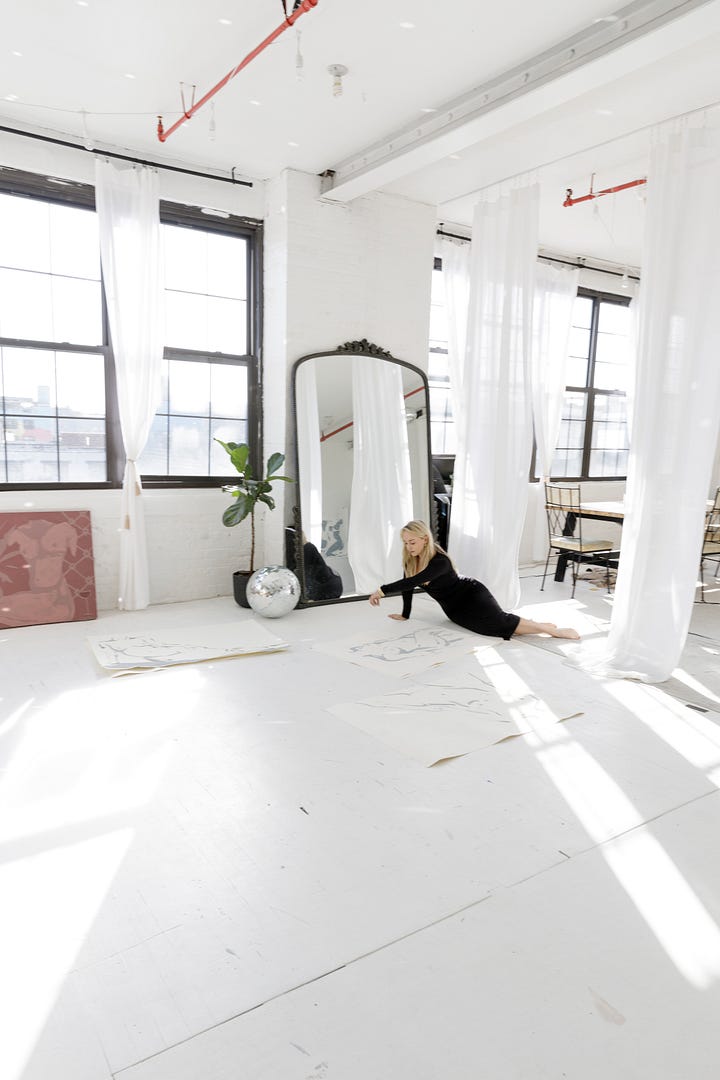
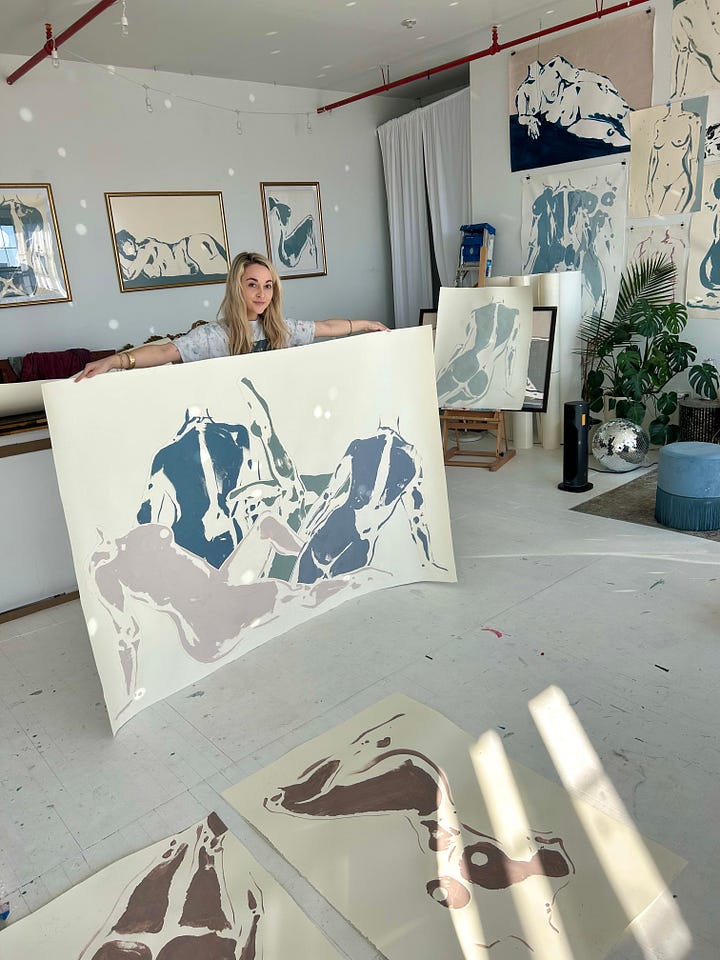
Can you walk me through your backstory? What led you to where you are today?
I’m from Mobile, Alabama. I grew up in your classic southern conservative family. I went to a very good school, but it was pretty much all white and everybody was kind of the same, so I didn't grow up around much culture. I was always different in a way and felt like I never fit in with anybody I went to school with. It seemed like I was always a bit more emotional than everybody else and lived with my heart on my sleeve. I took everything very personally. Maybe that is just the artist in me.
As a teenager, I was a bit rebellious. I moved out of my parents’ house for about a year in high school and lived with a family friend because I was really depressed. I had supportive parents, but they didn’t understand how to support mental health and it caused a massive strain between us. I failed out of school my freshman year of high school, dated much older guys, and partied too much. I later realized that I actually wasn’t THAT rebellious, but for the south and where I went to high school, I stood out like a sore thumb. When I went to college it felt like the greatest time of my life because I wasn’t living in my hometown, and I could let go a bit more and express myself. College was a chance for me to really open up and explore. I wanted to dye my hair pink, wear combat boots, smoke cigarettes, and listen to weird music I'd never heard before. I studied art and barely graduated college, but I had a blast and really figured out who I was. I gained a lot of confidence and grew as a person.
I worked throughout college to save money. When I graduated I decided that I was going to travel for a year. I set up an au pair job in Italy and stayed there for six months. After that, I backpacked in Europe for a few more months before deciding to go to Asia and Australia. I didn't have a return ticket for Australia, and I only had about $500 in my bank account when I got there, so I needed to find a job. I ended up staying in Australia off and on for two years and traveled throughout Asia, Europe, and South America over the next 4 years. I had no real intention of making it a 4-year journey, but that’s what happened.
In 2019, I came home for my sister’s wedding. I was in a relationship with a French man who I met in South America. He stayed in Alabama with me for two months and when we broke up I was absolutely devastated. This was also right around the time my family was going through a really messy divorce. Keep in mind that I was now 27 and hadn’t lived with my parents since I was 17. And to top off the breakup and family drama I was also brutally assaulted one night in a parking lot by a homeless man…all within a two-month period. I was fine physically, but I was incredibly traumatized after the assault. It felt like one thing after another was falling apart around me. This all happened before March when the pandemic hit. I knew that I needed to get out of the house I was living in, so I rented a really small bungalow-style house in my town that cost practically nothing and started making art. I was doing dog portrait commissions and a lot of children's portraits. It was my only source of income because nobody was hiring in March 2020. At that point, I thought the pandemic would only last a few months, and then I’d head back to South America or New Zealand so I wasn’t really trying to settle in. I did get a small bar job for a hot minute in February before the pandemic hit, but that only lasted about a month before things shut down. So at that point, it was art or nothing.
Around that time, one of my best friends said, “Why don’t you come to New York? None of my roommates are coming back any time soon.” I drove up to see her in Atlanta originally, and then we drove up together to her apartment in the East Village. It was originally just a trip for me to get away for two weeks, but I ended up staying there for almost 6 weeks. I was making dog paintings and flower paintings from her couch. Eventually, I signed a sublet and when the weather started to get colder, I returned home to get warmer clothes and move out of my Alabama lease.
Around September 2020, I started experimenting with body painting. I was my own model for the first few months. Eventually, it got to the point where I wanted to have people come in and model for my artwork so that I could make better paintings because it’s difficult to do by yourself. I started asking followers on Instagram who lived in New York if they knew somebody who needed money and wanted $10 an hour to come in, get naked in a stranger's apartment, and make body prints with me. Eventually, it turned into this thing where people said, “Oh, wow! I really love what I made. Can I buy this?” Then the Instagram started picking up a little bit more, not anything significant, but I started to get more of a New York following outside of friends and family. Random New Yorkers were wanting to come in. I’d hear things like, “I would love to do this. I've always struggled with XYZ. I feel like this would be really liberating for me.”
So it started with random strangers in my bedroom. Something that could only happen in New York. It grew, and I moved in with my boyfriend. We made our 7 by 9-foot office my art studio, and then I took over the entire apartment. Eventually, I had a second studio, then a third, and now I’ve moved into my fourth studio where I am today.
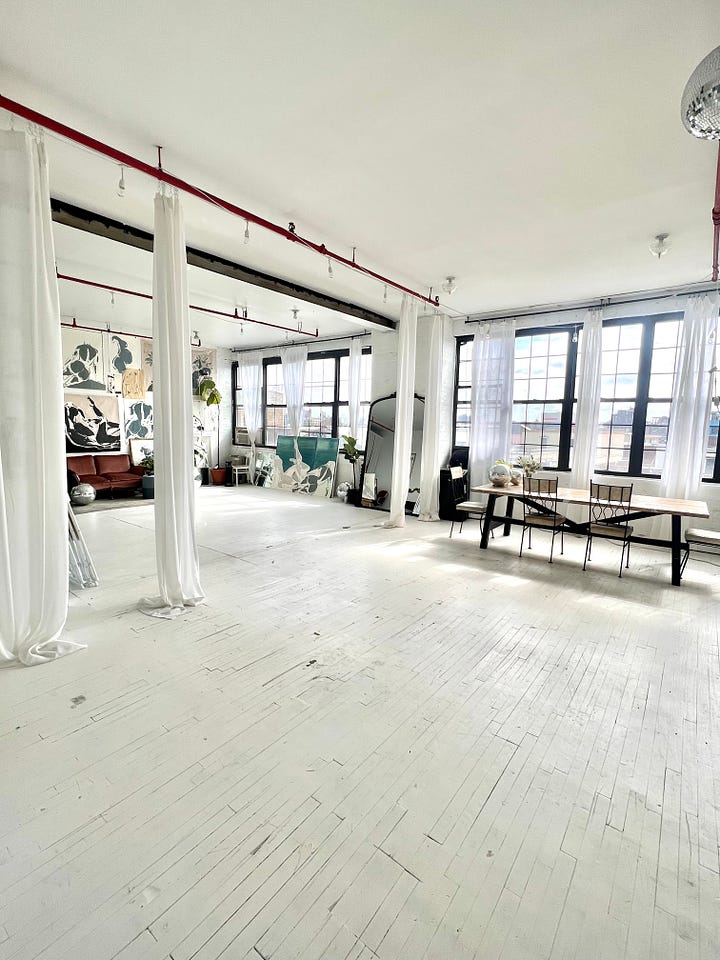
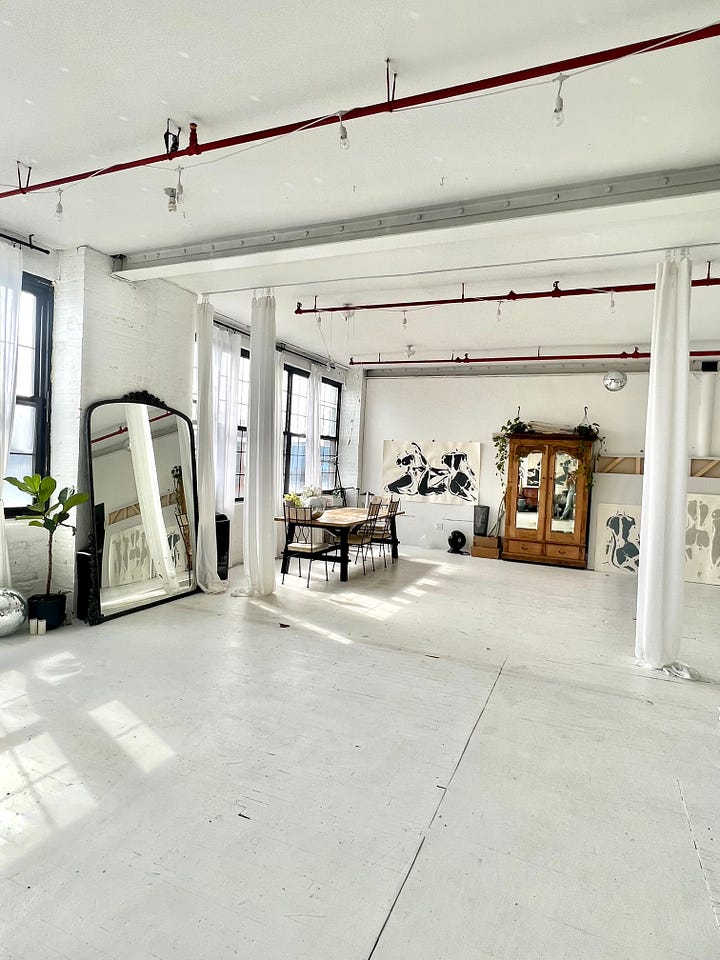
What an incredible story. You are one strong person. I want to go back to a few moments from your story, the first of which is the years you spent traveling. What did you learn about yourself during that time?
I think being a bit naive actually served me well haha. At that point in my life, I had only ever been comfortable. I worked throughout my college years, but I always had a fallback in case anything disastrous was to happen. I had never really faced anything that was super challenging other than being the black sheep. I had never experienced anything that was physically, financially, and mentally challenging the way that being all on your own in a foreign country is. I wanted that. I think I also had this mentality of, “I’m gonna show you” because I had the reputation of being a rebellious wild child, someone who didn’t live up to their potential and seemed to only create problems. I felt like no one understood me. I wanted to go out and prove them wrong. I really romanticized this time of my life and the simplicity of it.
I think one of the benefits that I had was that I didn't really care about nice things. I've never been very high maintenance. I’m happy to use shared bathrooms in a hostel or campground and have never desired designer items. I’m a go to Goodwill type of girl and don’t mind getting my hands dirty. I had that on my side, and I feel like you kind of have to if you want to commit to a backpacker lifestyle. I’m the type of person who flies into a new country with nowhere to stay and no idea what my route will be. I would land at the airport, go get a SIM card, figure out where the nearest hostel was, call a cab, go there, and then introduce myself to whoever was at the hostel. I’d find out: Where is everyone else going? What are they looking forward to doing in this country? I think doing that over and over gave me a new level of confidence.
The first year I ever traveled was my most expensive year. I spent the most money because I didn't know what I was doing. By year 4, I was spending a lot less money and having much cooler experiences. I think I learned a lot about myself and what I needed, as well as what I didn't need. I learned what kind of people I wanted to put myself around and what I wanted to spend my time doing.
I think there are many people who would hear your story of traveling and think to themselves, “Oh, that sounds awesome. I would love to do that, but I could never do it.” What would you say to them?
If I picked you up and dropped you in a country with a backpack and only a little bit of money, and you didn’t know anyone, then you would have no choice but to figure it out. When people say, “Oh, I could never do that,” I think they’ve just not been in a place to do it, or you've not put yourself in a place to want that challenge. A lot of it depends on you as a person, and I had that on my side. I can sleep in a hostel room with 10 people with a shared bathroom and that’s fine. I don’t need all the fluff. Honestly, anybody can do it. It's just a matter of what you want to get out of it.
There were so many people that I met while traveling, mostly older, and it was really interesting. The people who were in their thirties, forties, and fifties traveling were always the people who said, “I quit my job” or “There was a death in my family and it’s changed my outlook” or “Something happened and I couldn’t do it anymore.” The people who were in their twenties just wanted an adventure and to go out and see the world.
I want to flash forward to the time in your life before the pandemic. You had a lot of really tough stuff going on personally, at the same time the world was going through a difficult period. It would have been easy to just get stuck and get lost in what was going on but you didn't. You decided to go to New York and pursue art and try something new. What mindset gave you the spark to keep going and take a chance on something else?
Chaos and inconsistency had always been a part of my life in some fashion, and it was something I grew to be comfortable with. Art never faded away, and it was an outlet for me when I was too overwhelmed and couldn’t cope with chaos. Even though I wasn't making art all the time traveling, there was never a moment in my life where I didn't have a sketchbook, watercolors, and pencils in my backpack. It was always a priority in some way.
At that point in my life, it wasn't necessarily like, “Oh, I'm gonna go to New York and be an artist.” I just knew I didn’t need to stay where I was. I need to get out of that toxic place. At that time I was pulling in probably around $1,500-$2,000 a month from art, which I thought was amazing. It wasn’t a lot for full-time work, but I knew how to live on a little.
I was very intentional with where I wanted to be. At that point, it was nearing the middle of the summer of 2020, and I thought the pandemic would be over by the beginning of fall. I was planning to go to Mexico and then New Zealand. It was never the plan to be an artist in New York City. It wasn’t until it had to be the plan that I knew I was going to stay.
For most of us, it’s not a question of if fear will hit but when. What do you do to shift in the moments when fear hits?
Those feelings can be so defeating and can really drag you down. For example, last month my appointments sold out at the slowest rate they have ever sold out. They still sold out in 24 hours, but it wasn’t as fast as March where it took only 6 minutes. To me, it was a failure because it took 16 more hours to sell out. My mind immediately went to, “My business is falling apart. No one is interested in me anymore.”
I think in the beginning stages especially, it was so easy to compare myself to artists who were my age or younger and already selling their paintings for a ton of money and had amazing studios. I think one of the things I did really well was try to romanticize every step of the way. I really like to look at my life like a storybook. Think back to when you were a little kid and you were looking out the window of a car or airplane, and there was a song in the background, and you would play this kind of daydream moment in your head. I still do that today intentionally. I daydream and look at the chapter of my life when I was in my first apartment or my first studio, and I try to romanticize the struggles of being in New York City, not having a lot of money, and just starting out.
A lot of my friends had corporate jobs and were making real money. They could go out to dinner and spend $200 a person, and I couldn't do that. My first studio was literally a dirty wet basement with cockroaches in it. There was no heat down there. If it was 40 degrees in December, it would be freezing in my studio, and I’d have 5 space heaters going. To get through that I had to romanticize it and know there was going to be more to my story. That's why I think it's so important to document. You can look back in 6 months, or look back in a year, and feel gratitude for how far you’ve come. On a day-to-day basis, you don’t see much difference. It’s very rare that everything in your life changes the next day. It’s a slow process.
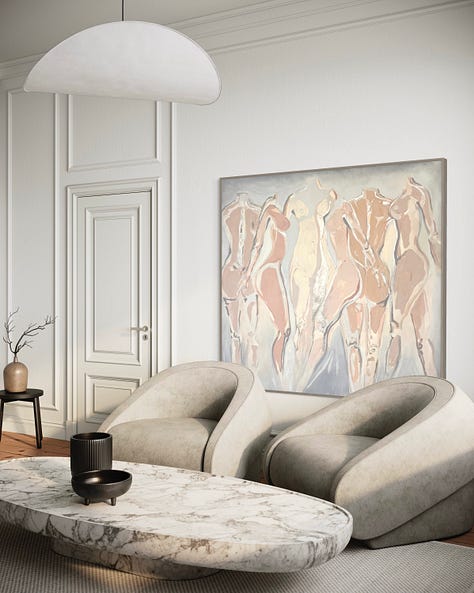
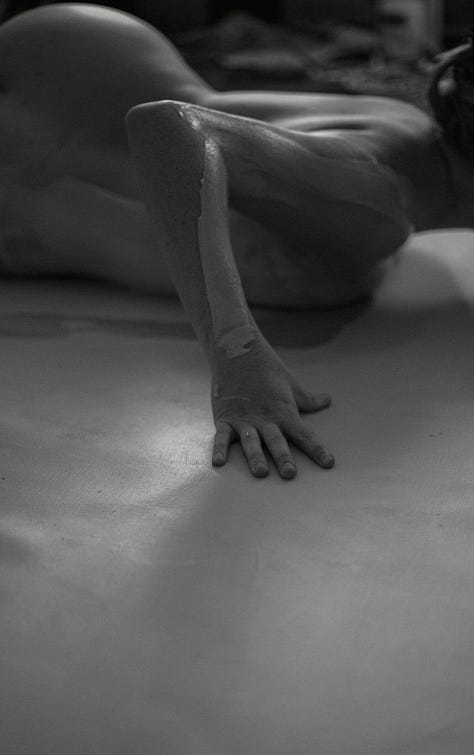
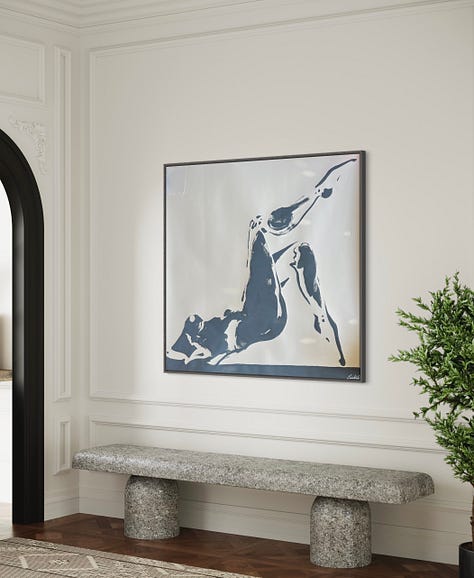
I’d love to talk about your work as an artist. You see people in a pretty vulnerable position and give them an empowering experience through your art. What has your work taught you about vulnerability?
Relative to most people, I’m okay with being vulnerable and open and talking about hard things or things I struggle with. But I think what has been really important for me to learn is how to react to vulnerability. The way that I react to someone being vulnerable can really change the outcome of how they choose to be vulnerable in the future. If I react and make it awkward, that can affect somebody. If I react in a way that makes them feel more comfortable and empathize with what they're going through, that can change the way they choose to be vulnerable in the future. People are vulnerable about different things. Some people come in, and they're totally fine with taking their clothes off, but maybe they are struggling with a recent miscarriage, or they just ended a relationship, or maybe they were just let go from their job. So it’s not just about being vulnerable about your body. It's hard to pick one thing I've learned about being vulnerable, but I think what I've learned is how to react to it well.
I do want to go back to where we started this conversation, which is some of the things that you're working on. What led to this realization of wanting to separate your work identity from your personal identity? What’s been helpful in making the shift?
Trying to do things outside of work and setting aside time for things that have nothing to do with work. I really am an all-or-nothing kind of gal. Whatever I'm currently interested in, it's all-consuming. Since hiring this personal trainer, I’ve noticed even since last week, that my mornings have felt way more productive, even though the personal trainer has nothing to do with work. Today, I had a workout, got a massage, and then went to work immediately after. By 2:00 pm, I felt like my day was so much more full. I also want to start taking ceramic classes. Yes, it's art, but it has nothing to do with making money. It’s just something I enjoy. I want to purposely do it in the evenings that way when I get home at 6:00 pm, I don’t immediately sit on the couch and watch Netflix until 10:00 or 11:00 pm, and then go to bed. I think planning things to look forward to is important. It’s been gradual because I’m someone who feels guilty when I spend time doing something that isn’t “productive” like making more money or marketing my business.
The theme of this blog is “no directions;” the idea that no one has lived the life that you were meant to live before. What’s the life that is uniquely yours starting to look like?
Freedom has always been my number one priority. I’m not a rule breaker, but I might be a bit of a rule bender haha. I have an unconventional way of doing things. I want to live intentionally without feeling tied down. If I can create art that helps people and create art for myself, while giving myself the flexibility and freedom I need, then I know I’m moving in the right direction. Everything from the way I structure my business to my relationships and daily life, I want to do while constantly learning and creating.



